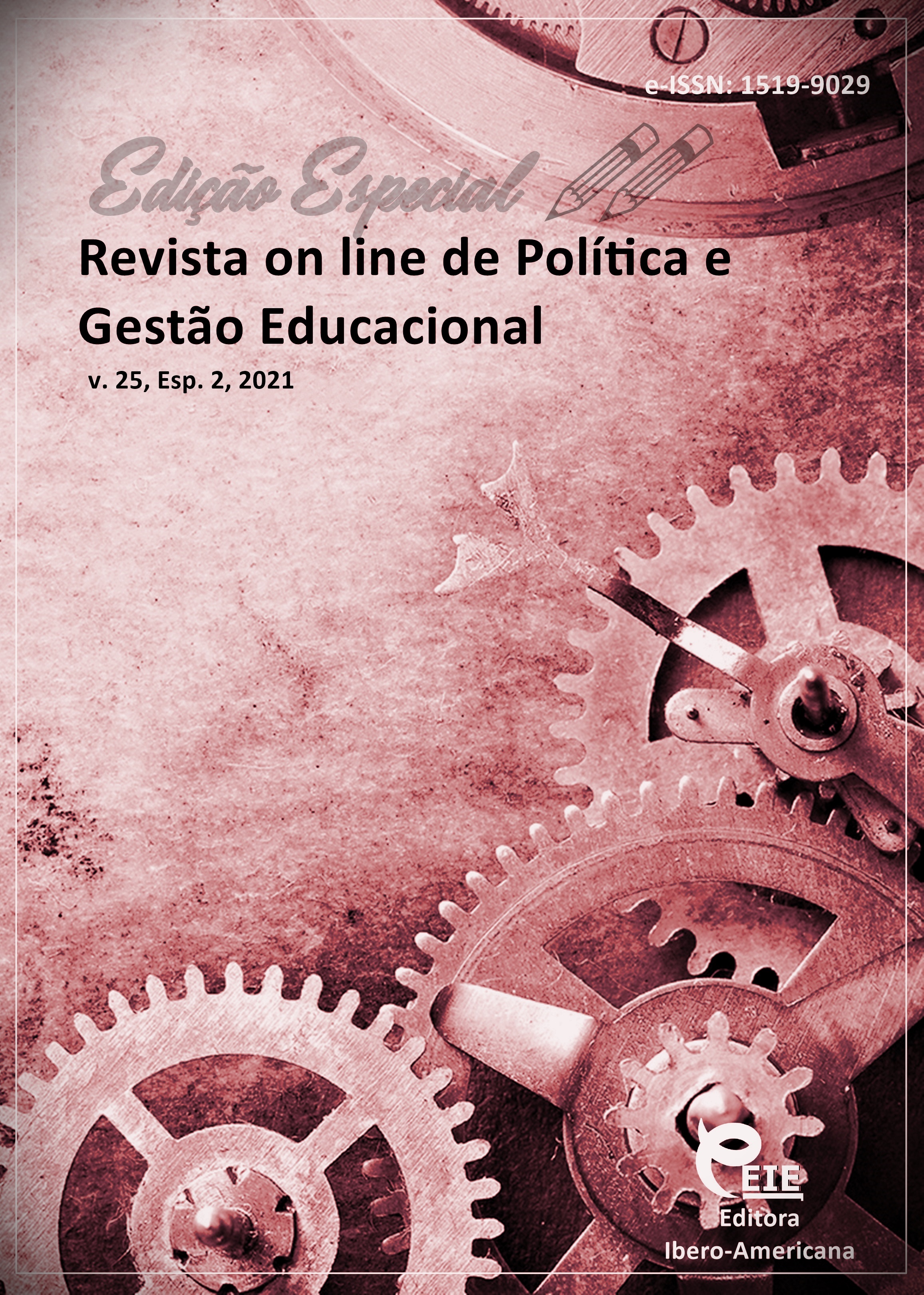The categorical framework of the theory of the formation of communicative creativity of university students
DOI:
https://doi.org/10.22633/rpge.v25iesp.2.15277Keywords:
Communicative creativity, Theory of the formation of communicative creativity, Scientific approaches, PrinciplesAbstract
The role of communication, the specifics and flow of communication processes and, accordingly, the requirements for their participants, is increasing in modern society and in all spheres of professional activity. In this connection, the problem of the formation of the communicative creativity of students at the stage of professional training at the university is actualized. At present, this aspect of the vocational training of students in technical areas lacks attention both in theory and in the practice of vocational education. The article examines the theoretical foundations of the theory of the formation of the communicative creativity of university students, interpreted as a set of interrelated and interdependent components that represent a certain integrity based on the use of a set of scientific approaches: systemic, participatory and discursive, implemented on the basis of the principles: transformation of cognitive content into emotional, freedom choice of communications, social reinforcement of creative behavior. The scientific approaches considered in the article were the theoretical foundations for the development of the theory of the formation of the communicative creativity of university students. The materials of the article are of practical value for organizing the process of vocational training in the context of the development of the communicative creativity of students.
Downloads
References
AKULOVA, I.S. et al. Experiences of tolerance: historical and philosophical analysis of multiculturalism (on the example of Magnitogorsk, Russia). The Social Sciences, Pakistan,. v. 11, n. 3, p. 6532-6535, 2016.
ALEKSEEVA, N. A. Formation of communicative creativity of a future specialist when teaching foreign languages: author’s abstract, Candidate of Psychological Sciences: 19.00.07. 2008. 232 p.
ANTROPOVA, L. G. Improvement of the teacher's communicative competence on the basis of creative reflection (in the context of additional education): author’s abstract, Candidate of Pedagogical Sciences: 13.00.01. 1999. 217 p.
ANTROPOVA, L. I.; LESHER, O.V.; FILATOV, V.V. Humanitarian training of engineers. Bulletin of G.I. Nosov Magnitogorsk State Technical University, v. 2, n. 26, p. 69-71, 2009.
AVERIANOV, A. N. Systematic knowledge of the world: methodological problems. Moscow: Politizdat, 1985. 263 p.
AZARENKO, S. A. et al. Humanitarian encyclopedia: concepts. Center for Humanitarian Technologies, 2002.
BAKHOLSKAIA, N. A. The impact of interactive learning on the development of the professional orientation of pedagogical students of higher educational institutions // Humanitarian and pedagogical research. G.I. Nosov Magnitogorsk State Technical University, v. 1, n. 1, p. 45-49, 2017.
BAKHOLSKAYA, N. A. et al. The impact of interactive model for university student teaching on their professional competence development. Revista Inclusiones, v. 6, n. 2, p. 179-184, 2019.
BLAUBERG, I. V. Formation and essence of the system approach. Moscow: Nauka, 1973. 270 p.
BOIKO, S. A. Teaching literary translation based on cognitive-discourse analysis of the text (English language, language university): author’s abstract, Candidate of Pedagogical Sciences: 13.00.02. 1992. 187 p.
BYSTRAI, E. B. Intercultural and participatory approach as a theoretical and methodological strategy for the formation of intercultural pedagogical competence. Bulletin of Orenburg State University, n. 6, p. 78-83, 2003.
DOLGIKH, M. V. Development of the communicative competence of university students: author’s abstract, Candidate of Pedagogical Sciences: 13.00.08. 2007. 193 p.
GRETSOV, A. G. Training of creativity for senior school and university students. St. Petersburg: Piter, 2008. 208 p.
IAKOVLEV, E. V. Pedagogical concept: methodological aspects of construction: monograph. Moscow: VLADOS, 2006. 239 p.
KARUNNAIA, O. V. Formation of communicative competence of teenagers when working with a fairy tale: author’s abstract, Candidate of Pedagogical Sciences: 13.00.01. 2008. - 237 p.
KAZIKIN, A. V.; LESHER, O. V.; TULUPOVA, O. V. Development of communicative creativity in masters of technical university: methodological aspect. Modern Journal of Language Teaching Methods, v. 7, n. 9, p. 29-40, 2017
KONARZHEVSKII, I. U. A. Pedagogical analysis of the educational process as a factor of increasing the efficiency of general education school management: author’s abstract, Candidate of Pedagogical Sciences: 13.00.01. Moscow, 1980. 32 p.
KUBRIAKOVA, E.S. Towards the concepts of discourse and discourse analysis in modern linguistics: an overview. Discourse, speech, speech activity: functional and structural aspects. Moscow, 2000. p. 5-13.
.
LESHER, O. V. et al. Diagnostics of the development of communicative creativity of university students in the process of intercultural communication. News of the Russian Academy of Education, v. 1, n. 25, p. 83-92, 2013.
LESHER, O. V.; KAZIKIN, A. V. Formation of students' creative identities in schools of higher education: structural and substantive aspects. Modern Journal of Language Teaching Methods, v. 6, p. 244-247, 2016.
MARIANNE, W. et al. Phillips. Discourse analysis. Theory and method. Kharkiv: Publishing house "Humanitarian Center", 2008. 352 p.
MESHCHERIAKOV, B. G.; ZINCHENKO, V. P. (Eds.) The great psychological dictionary: AST; AST-Moscow; Praim-Evrozna. Moscow: 2008. 860 p.
]
PASSOV, E. I. Forty years later or a hundred and one methodical idea. Moscow: GLOSSA-PRESS, 2006. 240 p.
POLAT, E. S. et al. New pedagogical and information technologies in the education system. Moscow: Publishing center “Academiia", 2003. 272 p.
SERIO, P. Discourse analysis in the French school (discourse and interdiscourse). 2. ed. Moscow: JSC IG "Progress", 1999. 416 p.
STUBBS, M. Discourse analysis: the sociolinguistic analysis of natural language. Oxford: Blackwell, 1983. p. 55-93.
Published
How to Cite
Issue
Section
License
Copyright (c) 2021 Revista on line de Política e Gestão Educacional

This work is licensed under a Creative Commons Attribution-NonCommercial-ShareAlike 4.0 International License.
Manuscritos aceitos e publicados são de propriedade da Revista on line de Política e Gestão Educacional. É vedada a submissão integral ou parcial do manuscrito a qualquer outro periódico. A responsabilidade do conteúdo dos artigos é exclusiva dos autores. É vedada a tradução para outro idioma sem a autorização escrita do Editor ouvida a Comissão Editorial Científica.











